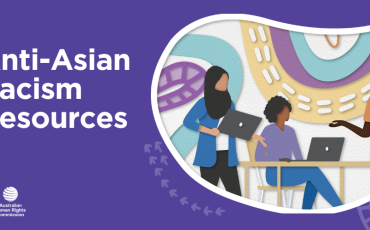Mapping government anti-racism programs and policies

This report enhances the Commission’s understanding of how Australia's national, state, territory and local governments engage in anti-racism work. It describes the nature and scope of their policies and programs over the past five years. This is important because it helps identify opportunities to expand and build on existing anti-racism work done by governments. It also helps to identify where the gaps are, and what can be done to address racism across all three tiers of government.
The Commission is currently developing a model for a National Anti-Racism Framework. The Framework will be a whole-of-society approach to addressing racism and will coordinate anti-racism efforts across Australian governments and sectors including business, education, health, justice, and others.
This report will inform the Commission’s development of a National Anti-Racism Framework. The Commission has also conducted extensive consultations as part of this work, including with First Nations and other negatively racialised communities.
The Commission contracted PwC Indigenous Consulting and Jumbunna Institute to conduct the research and produce the report.
Report methodology
The research for the report focused on publicly available information from federal, state and local government as well as the community sector including legislation, strategies, plans and frameworks, Reconciliation Action Plans, resource materials, campaigns, research, reviews and evaluations, position statements and grant funding programs. A range of Interviews about relevant policy and programs were also conducted with stakeholders across all levels of government, relevant community organisations, First Nations groups and academic research specialists.
Key findings
- There is a reluctance on the part of government to use the term ‘racism’
- Existing anti-racism work fails to enter public awareness, and has limited or no monitoring and evaluation or impact assessment
- The burden to address racism is still predominantly borne by people and communities who experience racism, rather than the systems, structures, and institutions that perpetuate it
- Government work at all levels appears to be ad-hoc, disjointed, and reactive
- Government work is most commonly focused on internal staffing issues
- Policy approaches lead to negatively racialised communities having to compete with each other for funding
- There is limited focus in programs and policies on First Nations communities’ experiences of racism
- Local government tends not to see itself as being responsible for addressing racism
- There is a failure of political bipartisanship on addressing racism
- There are some good practice examples of effective programs that should be supported and amplified
Recommendations
The report makes several high-level recommendations to the Commission, which will be incorporated into the Framework’s ongoing development:
- Recommendation 1: Establishment of a National Anti-Racism Council that brings together First Nations and CALD leaders and experts for the first time to advise government on strategic directions for policy and programs.
- Recommendation 2: Development of a nationally recognised definition of racism.
- Recommendation 3: Development of a clear, whole of government strategic approach to addressing racism and racist behaviours in Australian society.
- Recommendation 4: Inclusion of a formal monitoring and evaluation approach in the Framework for tracking and reporting on progress and implementation of government work addressing racism.
- Recommendation 5: Addressing racism in schools to ensure victims do not leave education facing lifelong disadvantage, and perpetrators do not enter adulthood believing racist behaviours are acceptable and do not attract accountability.
- Recommendation 6: Establishment of a national database or clearinghouse of anti-racism work, policies and programs, research and outcomes.
ENDS


